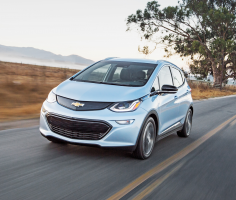
— A Chevy Bolt class action lawsuit alleges owners and lessees aren't receiving the range they paid for because General Motors won't allow customers to fully charge the batteries.
According to the lawsuit, GM allegedly concealed widespread defects in the 60 kWh 350V lithium-ion batteries that cause the Bolt cars to catch fire.
The Chevy Bolt class action lawsuit includes all U.S. owners and lessees of 2017-2019 Bolts.
According to the Bolt lawsuit, drivers began to have problems with the 2017 Chevrolet Bolt batteries, allegedly including the sudden inability to accelerate. The plaintiff says GM announced a customer satisfaction program for certain 2017 Bolts because of battery cells with low voltage levels.
The automaker said it would replace the battery packs in the affected 2017 Bolts, but the plaintiff says nothing was done about 2018-2019 models.
"GM did not address any possible widespread issue with the Defective Battery, and treated affected vehicles as individualized manufacturing errors or defects. However, there was a more insidious and widespread problem." - Chevy Bolt class action lawsuit
The GM owner who sued claims the high-voltage battery can overheat when it's nearly or fully charged, a problem GM is still trying to find a way to fix.
The Bolt lawsuit references a November 2020 Chevy Bolt recall for nearly 51,000 Bolt EV cars worldwide following at least five fires and two injuries. But the plaintiff claims GM waited years to issue the recall, then when it did announce the recall there were no repairs to prevent the cars from catching fire.
Owners of 2017-2019 Chevrolet Bolts were told to park outside, at least until the recalled electric cars are fixed.
However, the class action lawsuit alleges the interim fix offered by GM only reprograms the Bolts to charge the batteries up to 90% capacity.
The plaintiff says this means owners and lessees aren't getting the same travel range as advertised, and Bolt drivers must charge the batteries more often than advertised because of the reduced battery range.
The Bolt class action also alleges the cars have lost value because GM can't properly repair the vehicles.
The Chevy Bolt class action lawsuit was filed in the U.S. District Court for the Eastern District of Michigan: Shawn Walker, v. General Motors LLC.
The plaintiff is represented by Keller Rohrback L.L.P., Markovits, and Stock & DeMarco, LLC.




